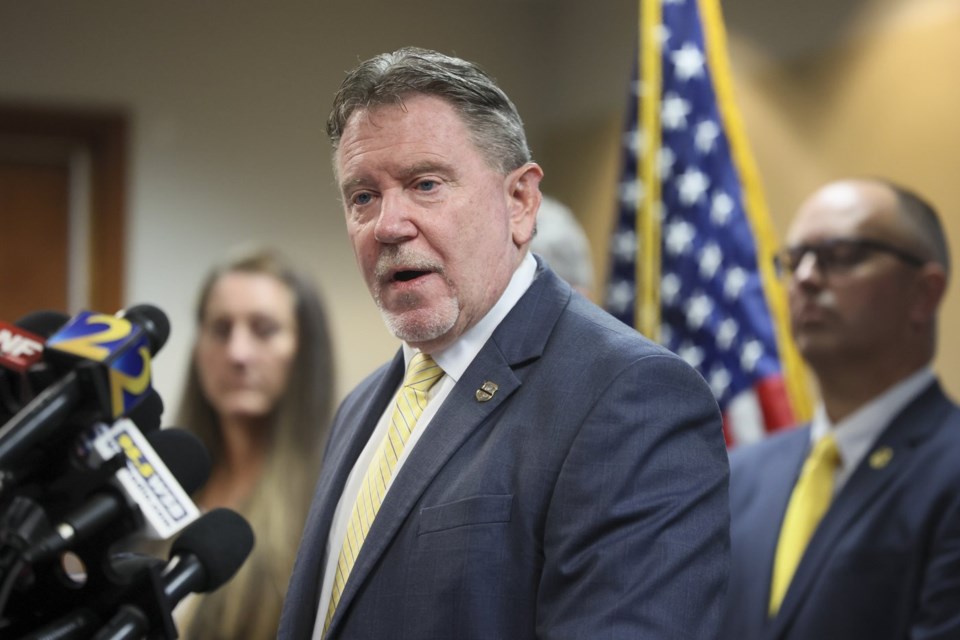ATLANTA (AP) — The man who fired more than 180 shots with a long gun at the headquarters of the U.S. Centers for Disease Control and Prevention broke into a locked safe to get his father's weapons and wanted to send a message against COVID-19 vaccines, authorities said Tuesday.
Documents found in a search of the home where Patrick Joseph White had lived with his parents “expressed the shooter’s discontent with the COVID-19 vaccinations,” Georgia Bureau of Investigation Director Chris Hosey said.
White, 30, had written about wanting to make “the public aware of his discontent with the vaccine,” Hosey added.
White also had recently verbalized thoughts of suicide, which led to law enforcement being contacted several weeks before the shooting, Hosey said. He died at the scene Friday of a self-inflicted gunshot wound after killing DeKalb County Police Officer David Rose.
The shooting reflects the dangers public health leaders have been experiencing around the country since anti-vaccine vitriol took root during the pandemic. Such rhetoric has been amplified as President Donald Trump's Health Secretary, Robert F. Kennedy Jr., has repeatedly made false and misleading statements about the safety of immunizations.
Calling for ‘rational, evidence-based discourse’
“We know that misinformation can be dangerous. Not only to health, but to those that trust us and those we want to trust,” Dr. Susan Monarez told CDC employees in an “all-hands” meeting Tuesday, her first since the attack capped her first full week on campus as CDC director.
“We need to rebuild the trust together,” Monarez said, according to a transcript obtained by the AP. “The trust is what binds us. In moments like this, we must meet the challenges with rational, evidence-based discourse spoken with compassion and understanding. That is how we will lead.”
White's parents have fully cooperated with the investigation of their son, who had no known criminal history, Hosey said Tuesday. With a search warrant at their home in the Atlanta suburb of Kennesaw, authorities recovered written documents and electronic devices that are being analyzed. Investigators also recovered five firearms, including a gun of his father's that he used in the attack, Hosey said.
White did not have a key to the gun safe, Hosey said: “He broke into it.”
CDC security guards stopped White from driving into the campus on Friday before he parked near a pharmacy across the street and opened fire from a sidewalk. The bullets pierced “blast-resistant” windows across the campus, pinning employees down during the barrage.
The GBI said more than 500 shell casings were recovered from the scene, underscoring the level of firepower involved. Authorities haven’t said how many shots were fired by White and how many by police. The GBI said forensic testing was still pending.
It could have been much worse
In the aftermath, CDC officials are assessing security and encouraging staff to alert authorities to any new threats, including those based on misinformation regarding the CDC and its vaccine work.
“We’ve not seen an uptick, although any rhetoric that suggests or leads to violence is something we take very seriously.” said FBI Special Agent Paul Brown, who leads the agency's Atlanta division.
Jeff Williams, who oversees safety at the CDC, told employees there is “no information suggesting additional threats currently.”
“This is a targeted attack on the CDC related to COVID-19," Williams said. “All indications are that this was an isolated event involving one individual.”
The fact that CDC's security turned him away “prevented what I can only imagine to be a lot of casualties," Williams said.
“Nearly 100 children at the childcare center were reunited with their parents at the end of the night,” he said. "The protections we have in place did an excellent job.”
RFK Jr.'s responses to the attack
Kennedy toured the CDC campus on Monday, accompanied by Monarez. “No one should face violence while working to protect the health of others,” Kennedy said in a statement Saturday, without addressing the potential impact of anti-vaccine rhetoric.
Kennedy refused to directly answer when asked during an interview with Scripps News on Monday what message he had for CDC employees who are worried about the culture of misinformation and skepticism around vaccines.
Although law enforcement officials have made clear the shooter was targeting the public health agency over the COVID-19 vaccine, Kennedy said in the interview that not enough is known about his motives. He described political violence as “wrong,” but went on to criticize the agency’s pandemic response.
"The government was overreaching in its efforts to persuade the public to get vaccinated and they were saying things that are not always true,” Kennedy said.
Some unionized CDC employees called for more protections. Some others who recently left amid widespread layoffs squarely blamed Kennedy.
Years of false rhetoric about vaccines was bound to “take a toll on people’s mental health,” and “leads to violence,” said Tim Young, a CDC employee who retired in April.
___
Contributors include Michelle R. Smith in Providence, Rhode Island, and Amanda Seitz in Washington, D.C.
Charlotte Kramon And Jeff Martin, The Associated Press



